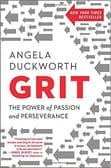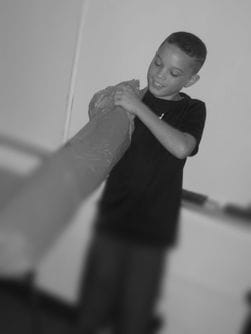| The first part of Angela Duckworth's Grit: The Power of Passion and Perseverance is titled What Grit Is and Why It Matters. In one of the more intesting chapters, Duckworth addresses the old nature-versus-nurture argument. The nature-nurture question is a very basic one. We have an intuitive sense that some things about us - like our height - are pretty much determined in the genetic lottery, while other things - like whether we speak English or French - are a result of our upbringing and experience. "You can't train height" is a popular expression in basketball coaching, and many people who learn about grit want to know if it's more like height or more like language. |
Duckworth explains that just as hundreds of genes determine height, the same is true of defining grit. This is not a single gene. The human body and psyche are complicated. Of course, we might have figured all of that out on our own, just as we might have surmised that the following is true:
Likewise, we learn, as novelist John Irving did, that "to do anything really well, you have to overextend yourself," to appreciate that, "in doing something over and over again, something that was never natural becomes almost second nature," and finally, that the capacity to do work that diligently "doesn't come overnight."
First comes interest. Passion begins with intrinsically enjoying what you do...With enduring fascination and childlike curiosity, [gritty people] practically shout out, "I love what I do."
Next comes the capacity to practice. One form of perseverance is the daily discipline of trying to do things better than we did yesterday. So, after you've discovered and developed interest in a particular area, you must devote yourself to the sort of focused, full-hearted, challenge-exceeding-skill-practice that leads to mastery. You must zero in on your weaknesses, and you must do so over and over again, for hours a day, week after month after year. To be gritty is to resist complacency...
Third is purpose. What ripens passion is the conviction that your work matters. For most people interest without purpose is nearly impossible to sustain for a lifetime. It is therefore imperative that you identify your work as both personally interesting and, and at the same time, integrally connected to the well-being of others...
And finally, hope. Hope is a rising-to-the-occasion kind of perseverance...but hope does not define the last stage of grit. It defines every stage. From the very beginning to the very end. it is inestimably important to learn to keep going even when things are difficult, even when we have doubts. At various points, in big ways and small, we get knocked down. If we stay down, grit loses. It we get up, grit prevails.
| I have to say, in sorting through all of the stories that the author tells and the interviews she conducts, I find this listing of the process to be easy to understand. Coming from an educator's point of view, I can share that process with my students. But as simple as the definition is, the process is definitely not as easy. For example, how does a teacher get a student interested? Is it a matter of students seeing the teacher's exuberance for a subject? That has to be a part of it. If I were writing a book about grit, specifically aimed at education, I would add a section about the myths perpetuated by teachers. Those myths, in my opinion, include some of my Professional Pet Peeves, and you can read about some of those here: |
Finally, in the closing paragraphs of part one, Mrs. Duckworth encourages me with these lines:
The four psychological assets of interest, practice, purpose, and hope are not You have it or you don't commodities. You can learn to discover, develop, and deepen your interests. You can acquire the habit of discipline. You can cultivate a sense of purpose and meaning. And you can teach yourself to hope.
I know, as you do, that a kid will appreciate the reward of learning more if s/he realizes the effort it takes. Looking back at the pains of learning makes pupils understand better the value of their investment in the process. That seems to work for many, but it works it works in different ways for different people.
I read this book from a couple of point of view - first, as an educator, as I've addressed here in helping other people develop their own grit, but secondly, as a person who must cultivate determination, goal-setting, and the rest, in myself. How can I meet my personal goals? How do I become the human being that I want to be - as a parent, as a teacher, and as a Christian?









































